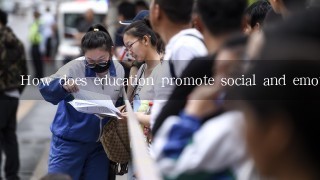How does education promote social and emotional growth?

Education plays a crucial role in promoting social and emotional growth in children and adolescents. It provides a safe and nurturing environment where children can learn and develop essential skills that contribute to their social well-being and emotional regulation.
1. Fostering Communication Skills:
- Education exposes children to different perspectives and encourages them to express themselves clearly and respectfully.
- Teachers provide opportunities for children to practice active listening, empathy, and conflict resolution skills.
2. Developing Social Skills:
- Educational activities often involve teamwork, group projects, and presentations, fostering collaboration, communication, and leadership abilities.
- Children learn to navigate social situations, build relationships, and resolve conflicts effectively.
3. Promoting Emotional Intelligence:
- Education teaches children about emotions, self-awareness, and empathy.
- Through literature, discussions, and role-playing, children learn to identify, understand, and manage their emotions.
4. Cultivating Self-Esteem and Confidence:
- Education provides a safe space for children to explore their talents, abilities, and worth.
- Teachers encourage self-reflection, self-esteem, and a positive self-image.
5. Fostering Critical Thinking Skills:
- Educational experiences challenge children to think critically, ask questions, and solve problems.
- This promotes problem-solving skills, creativity, and decision-making abilities.
6. Promoting Social Responsibility:
- Education teaches children about civic engagement, empathy, and the importance of contributing to their communities.
- Children participate in discussions about social issues, volunteer, and make a difference in their surroundings.
7. Supporting Emotional Regulation:
- Education provides tools and strategies for managing emotions, such as relaxation techniques, mindfulness, and coping mechanisms for dealing with stress.
- Children learn to self-regulate their emotions and build resilience.
8. Promoting Lifelong Learning:
- Education encourages a love of learning and a thirst for knowledge.
- Children are exposed to diverse perspectives and topics, fostering a lifelong love of learning.
Conclusion:
Education plays a profound role in promoting social and emotional growth in children and adolescents. By fostering communication skills, developing social abilities, promoting emotional intelligence, cultivating self-esteem, fostering critical thinking, promoting social responsibility, supporting emotional regulation, and encouraging lifelong learning, education empowers children to navigate social interactions, build healthy relationships, and become well-rounded individuals.





































































